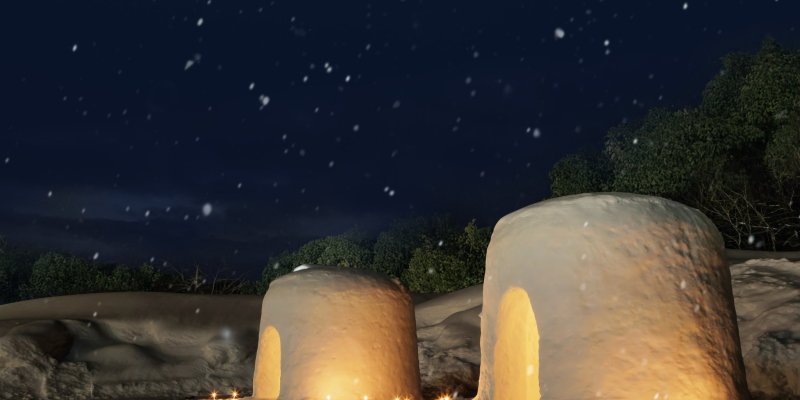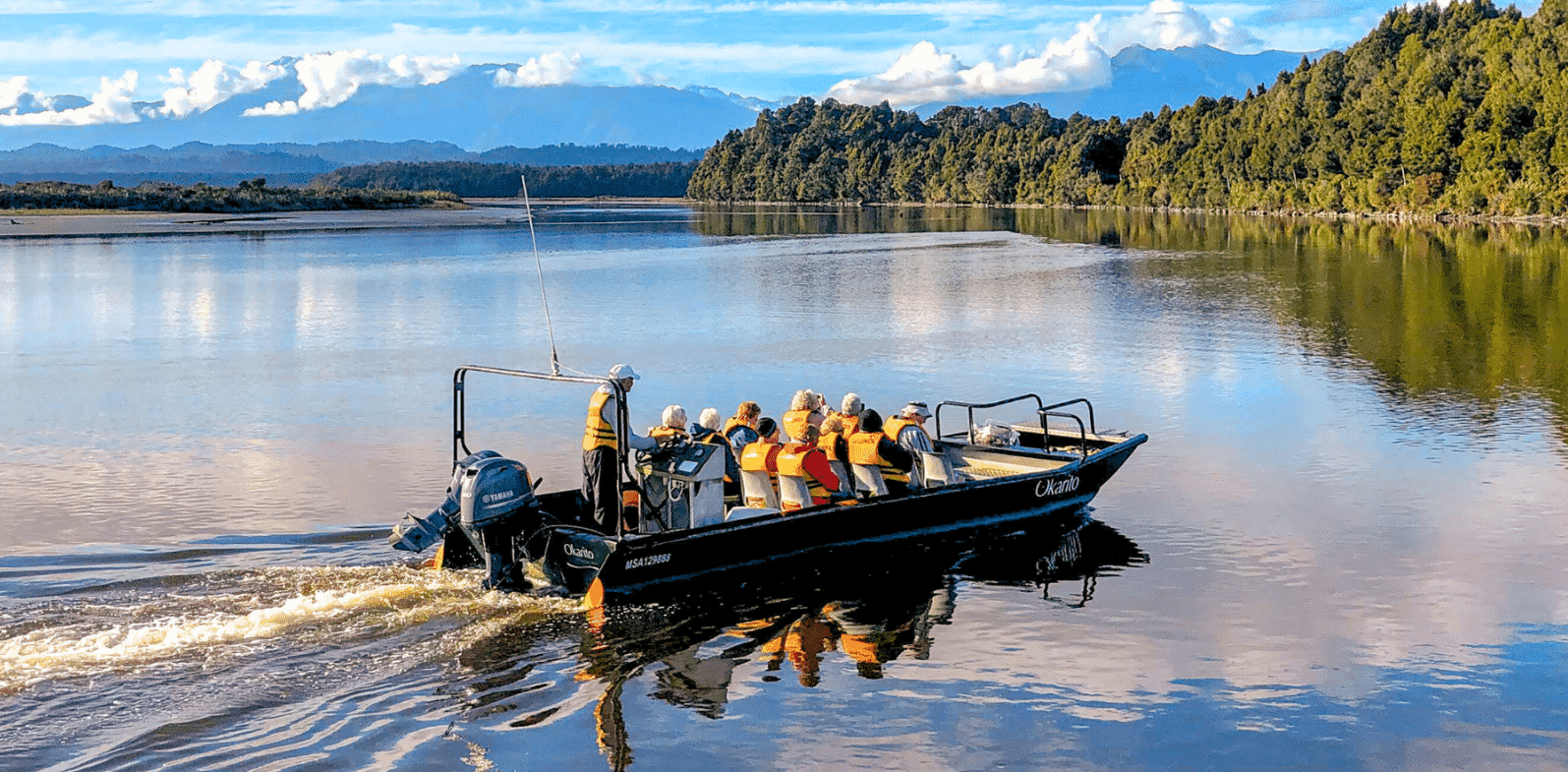You probably have the northern lights on your bucket list, but did you know there are impressive aurora light shows in Victoria?
While tourists flock in the thousands to see the northern lights, the southern lights are a little more elusive – possibly because of their remote locations, and hence difficulty for travellers to access. The good news is that solar activity is expected to peak in 2024/2025, and seeing the aurora australis in Victoria is even more likely.
Here’s everything you need to know for your best chance at spotting the southern lights (aurora australis) in Victoria.
What are the southern lights?
Auroras occur when fully charged particles burst from the sun, creating a solar wind that slams into the Earth’s magnetic field and rushes towards the North and South Poles. As the solar particles collide with atoms of nitrogen and oxygen in our atmosphere, their electrons charge, leaving ions that radiate energy in wavelengths and producing a spectacular natural dancing rainbow.
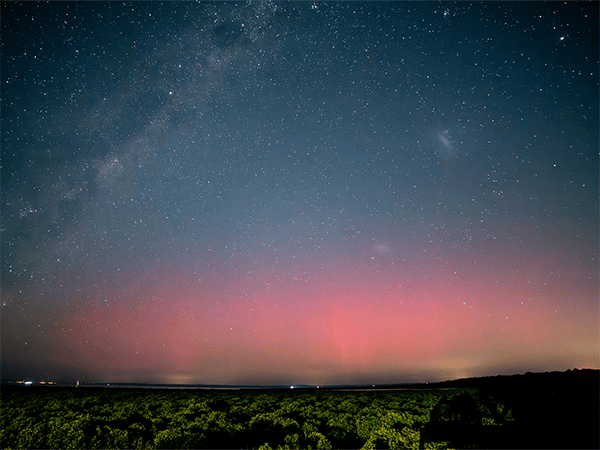
Increased solar activity has resulted in the southern lights being seen in Blind Bight in Melbourne. (Image: Getty Images/ FiledIMAGE)
Where to see the southern lights in Victoria
There’s an element of magic to any aurora – no matter how perfectly you plan, a viewing is never guaranteed. Adding to the mystery, there’s no peak time or season to see an aurora, and no one really knows until right before it happens. They could glow for minutes or hours at any time of the night.
But for your best shot at catching the magic in Victoria, you’ll want to head far south. Point Lonsdale, the south side of Phillip Island, Aireys Inlet, Anglesea and Cape Liptrap Coastal Park are all good options. But Wilsons Promontory National Park is a standout for its pitch-black skies and southerly location.
Wilsons Promontory National Park
A three-hour drive from Melbourne, Wilsons Promontory National Park offers verdant views and nature adventures by day, a serene starscape by night and, if you’re really lucky, an aurora light show. You can camp beneath the stars at Tidal River Campground or check into one of the local cabins or wilderness retreats.
Point Lonsdale
Ninety minutes south-west of Melbourne on the Bellarine Peninsula, Point Lonsdale is known for its scenic lookouts and iconic lighthouse. Head to Point Lonsdale Lighthouse for spectacular photos of the lights and tower. Staying the night? Opt for one of the seven luxury suites at Lon Retreat & Spa which are perched on a hill – perfect for stargazing.
Phillip Island
90 minutes south-east of Melbourne, Phillip Island stretches out into the Bass Strait and is brimming with wildlife, hiking trails, and idyllic beaches. There are a plethora of camping and glamping spots on the island that will provide darkness and uninterrupted southern lights viewing opportunities. Alternatively, treat yourself to a night in one of the luxury bed and breakfast “pods” at The Nest.
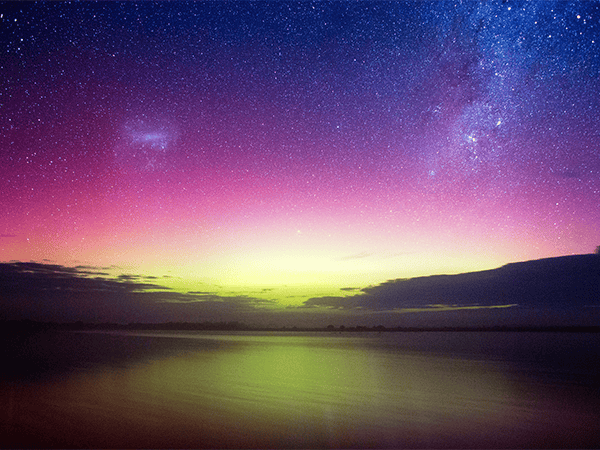
For your best chance at spotting the southern lights, head far south. (Image: Getty Images/dannogan)
Aireys Inlet
Located between Melbourne and the Twelve Apostles on the Great Ocean Road, Aireys Inlet is home to another iconic lighthouse which was featured in the popular TV show Round The Twist. Split Point Lighthouse provides a great vantage point for capturing the lights and rugged coastline.
Anglesea
Another Great Ocean Road hotspot is Anglesea. This coastal town is renowned for its patrolled surf and swimming beaches and nature conservation areas, the latter of which makes it perfect for aurora watching.
Cape Schanck Lighthouse
It’s not as far south as other spots, but Cape Schanck Lighthouse on the southernmost tip of the Mornington Peninsula is a favourite location for southern lights photographers. Base yourself at the freshly finished Cape Schanck Resort before heading out to catch the lights.
When to see the southern lights in Victoria
Auroras can be seen year-round, but no one knows until right before it happens. They could glow for minutes or hours at any time of the night. While the southern lights aren’t as affected by seasonal light change as the northern lights your best bet at witnessing the phenomena is still in the winter months.
To further your chances of successful aurora hunting, look up the space weather forecast on the Australian Bureau of Meteorology which will show you when solar activity is predicted. You can also follow the Aurora Hunter Victoria page on Facebook where members chat about active aurora nights.
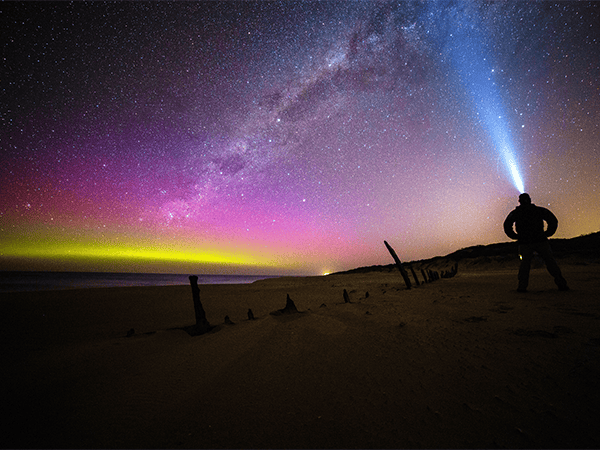
High ISO was used to capture the colour and night sky in this dazzling photo. (Image: Getty Images/dannogan)
Find tips for photographing the aurora australis in our southern lights guide.
Book a hotel in Melbourne
This article was originally written by Jessica Humphries.
